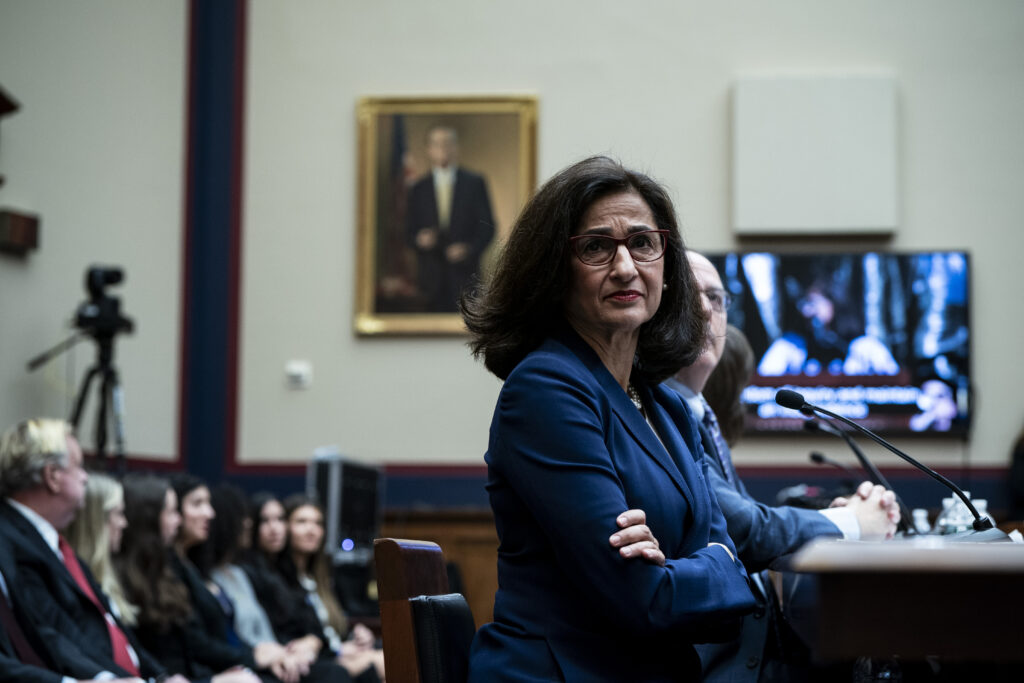 Minouche Shafik, the president of Columbia University, testified before Congress last week. MUST CREDIT: Haiyun Jiang for The Washington Post
Minouche Shafik, the president of Columbia University, testified before Congress last week. MUST CREDIT: Haiyun Jiang for The Washington PostMerlin Van Alstine, a University of Minnesota student and an organizer with the school’s chapter of Students for a Democratic Society, had watched for four days as hundreds of pro-Palestinian protesters at other college campuses were arrested.
Van Alstine, 21, and about 30 other students were inspired to set up their own encampment. By Tuesday morning, nine of her fellow demonstrators were arrested and charged with trespassing.
It was one of the latest examples of pro-Palestinian protests sweeping college campuses across the country with students demanding that their universities cut ties or reveal their involvement with corporations doing business with Israel or profiting off the war in Gaza.
The arrest of more 100 student protesters at Columbia University on Thursday has sparked solidarity protests at colleges across the nation, from Yale University and MIT on the East Coast to Ohio State University in the middle of the country and Stanford University and the University of California at Berkeley out west.
This is how the burgeoning protest movement started, escalated and spread – and where it might go from here. Commencements for the class of 2024 begin in weeks.
– – –
A protest at Columbia
Last Wednesday, protesters set up tents on the South Lawn of Columbia University and flew Palestinian flags. They held demonstrations in which they chanted, banged on noise makers and denounced the “genocide” in Gaza.
But around midafternoon the next day, New York police began breaking up a protest at Columbia, arresting demonstrators who had occupied a campus lawn in support of Palestinians.
This came at the request of Columbia President Minouche Shafik, who had written to the New York Police Department earlier in the day to tell them that protesters had been trespassing on the South Lawn of the university’s Morningside Heights campus and represented “a clear and present danger to the substantial function of the University.”
She requested that the department send officers to campus to remove them. In total, 108 were arrested.
The protest came a day after Shafik testified before Congress, pledging to lawmakers during a hearing on antisemitism to balance students’ safety with their right to free speech.
Shafik told members of the House Committee on Education and the Workforce that balancing the free speech rights of those who want to protest with the rights of Jewish students to be free of harassment and discrimination at Columbia has been the central challenge on campus. Her hearing followed one in December in which three other university presidents – from Harvard, the University of Pennsylvania and MIT – were scrutinized over their testimony before Congress, during which they declined to say calls for the genocide of Jews would violate campus policies. The leaders of Harvard and Penn later resigned.
– – –
More student antiwar protests
There weren’t as many protests on Friday and over the weekend, but starting Monday, protests sprang up at college campuses across the country, including at New York University, the University of North Carolina at Charlotte and the University of Michigan.
At Yale, 47 students are arrested. Officers gave one warning around 6 a.m. and within minutes began arresting protesters who had been camped out on Beinecke Plaza.
Those students were charged, processed and released – and almost all of them reconvened at an off-campus intersection near Beinecke to join hundreds of others to continue their protest as New Haven police blocked the intersection and looked on.
Meanwhile, on Monday night, 120 protesters were arrested at NYU’s campus. And on the West Coast, students at California State Polytechnic at Humboldt barricaded themselves inside a building, the campus went on lockdown, and administrators eventually closed the campus through Wednesday; the university urged people to stay away from the “dangerous and volatile situation” at the hall and said it was “deeply concerned about the safety of the protesters.”
– – –
Where do the antiwar protests go next?
After the nine arrests at the University of Minnesota on Tuesday, the movement made its way to the District. On Tuesday, hundreds of American University students marched to the president’s office building to demand that the administration divest from Israel.
The protest came a day after the school’s undergraduate senate passed a nonbinding resolution calling for divestment, to which President Sylvia Burwell said in a statement that the resolution “does not represent American University’s position and will not be implemented.”
Freshman Kaden Ouimet said that despite Burwell’s rejection, protesters would not be deterred in large part because they knew they had compatriots at colleges around the country.“We will not be demoralized,” said Ouimet, a political science major and senator at-large in student government. “And although the path to divestment is a long and treacherous one, campuses are standing in solidarity.”How antiwar student protests are spreading across U.S. universities
2024-04-29T11:08:00+05:30
